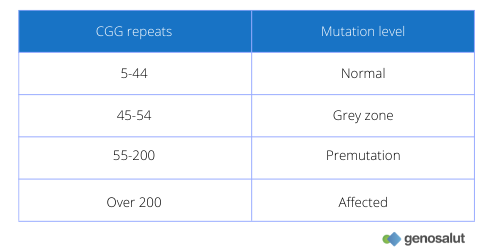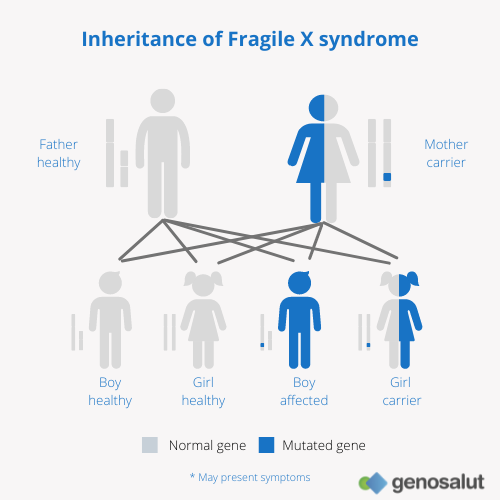Fragile X syndrome
Test for Fragile X syndrome (caused by a mutation in the FMR1 gene) in women with fertility problems (premature ovarian failure).
Price
180€ (includes genetic counselling)
Time to result
2 weeks
What is Fragile X syndrome and what causes it?
Fragile X syndrome is an inherited genetic disorder linked to the X chromosome. Almost all cases of Fragile X syndrome are caused by a mutation in the FMR1 gene. This mutation is an abnormal expansion of a triplet nucleotide repeat (CGG) region at the end of the X chromosome that inactivates (silences) the FMR1 gene and prevents it from producing the corresponding protein FMRP1 (Fragile X mental disability protein). This protein is essential for normal brain development and its loss causes the typical signs and symptoms of Fragile X syndrome.
The syndrome is named after the fact that this mutation causes a small break in one of the arms of the X chromosome known as the fragile site, which only becomes apparent when the chromosome is treated under specific conditions in the laboratory.
The prevalence of this syndrome is 1 in 4,000 males and 1 in 8,000 females worldwide. It is the most common cause of inherited intellectual disability in males and is also a major cause of intellectual disability in females.

As we have already indicated, the cause of Fragile X syndrome is the extension of a repetitive region (CGG triplet) at the end of the X chromosome. Thus, according to the number of copies of this triplet, we classify people as follows:
- Healthy people: this repetitive region of DNA is repeated 5 to 44 times.
- People in the so-called grey zone: they have 45 to 54 repeats.
- Healthy people (without symptoms) who carry what is called a premutation. This premutation is characterised by a number of repeats between 55 and 200. However, women with this premutation are more likely to have fertility problems related to their ovarian reserve and in addition, the premutation can expand to more than 200 repeats in the germ cells that develop into eggs. This means that women with the FMR1 premutation have an increased risk of having a child with Fragile X syndrome.
- In people with Fragile X syndrome, the CGG segment is repeated more than 200 times. It is this expansion that inactivates (silences) the FMR1 gene.
Study of Fragile X syndrome in the context of fertility
The disease also affects the reproductive health of carriers and patients. As mentioned above, women carrying a premutation are at increased risk of early ovarian failure and juvenile menopause due to low ovarian reserve. Approximately 20% of women with premutation have premature ovarian failure compared to 1% of the normal population.
Study of Fragile X syndrome
At Genosalut we perform a molecular study that allows us to detect the expansion of the CGG triplet found in the 5’UTR region of the FMR1 gene, which causes 99% of cases of Fragile X syndrome.
This study allows to determine the number of repeats and to distinguish between a range of normal CGG repeats (5-44 repeats), grey zone (45-54 repeats), premutated (55 to 200 repeats) or full mutation (more than 200 repeats).
The study has a reliability of 99%.
Our value proposal
Experience
At Genosalut, we have more than 10 years of experience in counselling people with conditions where a genetic cause has been identified or is thought to be possible.
Proximity
We are a close laboratory, we respond personally and we take the time to explain the report in detail to doctors and patients.
Professional interpretation of results
Because of our knowledge and experience, we are able to accurately interpret genetic results and offer professional advice.
Reference in the field
We are the point of contact for patients, doctors and clinics in all areas of human genetic diagnostics and prevention.
When testing for Fragile X syndrome is recommended
In the context of fertility, the study of Fragile X syndrome is recommended:
- In women with fertility problems related to elevated follicle stimulating hormone (FSH) concentrations. Especially in the following cases: female relatives with premature ovarian failure, family history of Fragile X syndrome, or intellectual or developmental disabilities with undetermined causes.
- In young women with low ovarian reserve or early menopause.
Female carriers of Fragile X syndrome can transmit the disease to their offspring:
- 50% of sons could be affected.
- 50% of daughters may be carriers or have some degree of the disease.

Information from the Fragile X study
You can find out the cause of fertility problems
The detection of a premutation or mutation is the possible cause of premature ovarian failure or early menopause in women with fertility problems. Knowledge of this result and counselling by our specialists will allow you to know the possibilities of treatment.
You can know the risk of having affected offspring
The detection of a premutation or mutation implies a risk (higher in the second case) of having offspring who are carriers (some girls) or affected by the disease (both boys and some girls, although boys have more severe symptoms). In both cases, during genetic counselling, we advise couples so that they can decide freely but aware of the risk they are taking and of the therapeutic possibilities: in vitro fertilisation, prenatal diagnosis, pre-implantation genetic diagnosis and oocyte donation.
How can I request a test for Fragile X syndrome?
Request an appointment
Contact us through the form, by e-mail or by telephone to make an appointment with us.
Ask your physician
You can also consult your doctor for information on the possibilities of genetic testing.
We analyse the probe
In our genetic diagnostics laboratory we analyse the sample with the latest technology.
We write a report
We provide a detailed description of the results and, if necessary, genetic counselling.
FAQs
What are the symptoms of Fragile X syndrome?
Symptoms of Fragile X syndrome are varied:
Early signs include speech and language delay.
- Intellectual problems range from mild learning disabilities to severe mental retardation.
- Behavioural characteristics include autism, hyperactivity and poor eye contact.
- Physical features, such as an elongated face and large or protruding ears, are usually more noticeable in adults than in children, and in males more than in females.
Only the complete mutation causes Fragile X syndrome. This modified gene can be passed from one generation to the next, most commonly through the mother.
Fragile X syndrome in men and women
Because males have only one X chromosome, they will have the disease (in a variable range of symptoms and severity) if they have inherited the full mutation.
Because females have 2 X chromosomes, the unaffected X chromosome may compensate to a greater or lesser extent for the one with the Fragile X mutation. In other words, females with a full mutation have a wide range of characteristics, although they tend to have milder symptoms than males with a full mutation, and may not even be aware of their status.
What results can be obtained in a study of Fragile X?
The results that can be obtained are:
- 5 to 44 repeats is considered normal.
- Not affected by Fragile X syndrome or FMR1-related disease.
- Not a carrier and not at risk of having a child with Fragile X or related disease.
- 45 to 54 repeats is considered a grey area.
- Not affected by Fragile X syndrome or FMR1-related disease.
- If it is a female, she has a higher chance of passing on a larger triplet expansion (a premutation, see below) to her children. After multiple generations the expansion can lead to Fragile X syndrome.
- 55 to 200 repeats is considered premutated.
- Some women are at risk of premature ovarian failure.
- About 17% of women and 47% of men over the age of 50 will develop Fragile X or ataxia syndrome.
- With each pregnancy, women carrying the premutation have a 50% chance of passing on the X chromosome with the expanded FMR1 gene to their child. The probability that the premutation will expand to the full mutation range when transmitted depends on its initial size. Premutations with more than 90 repeats almost always expand to the full fragile X syndrome in the next generation.
- Parents pass on one X chromosome or one Y chromosome to their children. Parents with an FMR1 premutation on their X chromosome will pass it on to all their daughters. The premutation is not likely to spread when passed on by the parents. Since Y chromosomes do not have the FMR1 gene, parents do not pass on a premutation to their sons.
- More than 200 repeats is considered a full mutation.
- All males with a full mutation are affected with Fragile X syndrome, the severity of symptomatology is variable in each case.
- Females with a full mutation may have no symptoms or a wide range of manifestations and severity.
- If Fragile X syndrome is diagnosed prenatally in a foetus, it is impossible to predict what symptoms a child will have or their severity.
- With each pregnancy, a mother with a full mutation has a 50% chance of passing it on to her child.
- Men with full mutations and a diagnosis of Fragile X syndrome usually do not have children. If they do have children, fathers do not pass on a full mutation to their sons, as the Y chromosomes do not have the FMR1 gene. It seems that fathers cannot pass on full mutations to their daughters, but scientists do not know why.
What fertility treatments are available for Fragile X syndrome?
- Young women with an eventual diagnosis (e.g. family screening) who do not yet wish to have children: possibility of preserving eggs in anticipation of possible premature ovarian failure or early menopause.
- Women who wish to become pregnant provided that their ovarian reserve is sufficient: in vitro fertilisation with pre-implantation genetic diagnosis or prenatal diagnosis.
- Women who wish to become pregnant but have no ovarian reserve: oocyte donation.
- If it is the man who suffers from Fragile X syndrome, donor sperm can also be used to prevent the transmission of the pathology to the offspring.
Who covers the costs of the Fragile X study?
Fragile X syndrome testing is covered by some private insurances and sometimes depends on meeting certain diagnostic criteria. You can come to us with a certificate from your doctor or with your insurance card.
Request an appointment with us
Opening hours
Monday to Friday from 9.00 am to 1.00 pm
+34 616 59 01 65
info@genosalut.com
Camí dels Reis, 308 (Clínica Palma Planas)
Contact form
Reasons for trusting Genosalut
First genetic diagnosis laboratory in the Balearic Islands
Professionals with experience in medical genetics
Detailed report of the results
Personalised attention for each patient
Wide range of genetic tests
Cutting-edge technology
